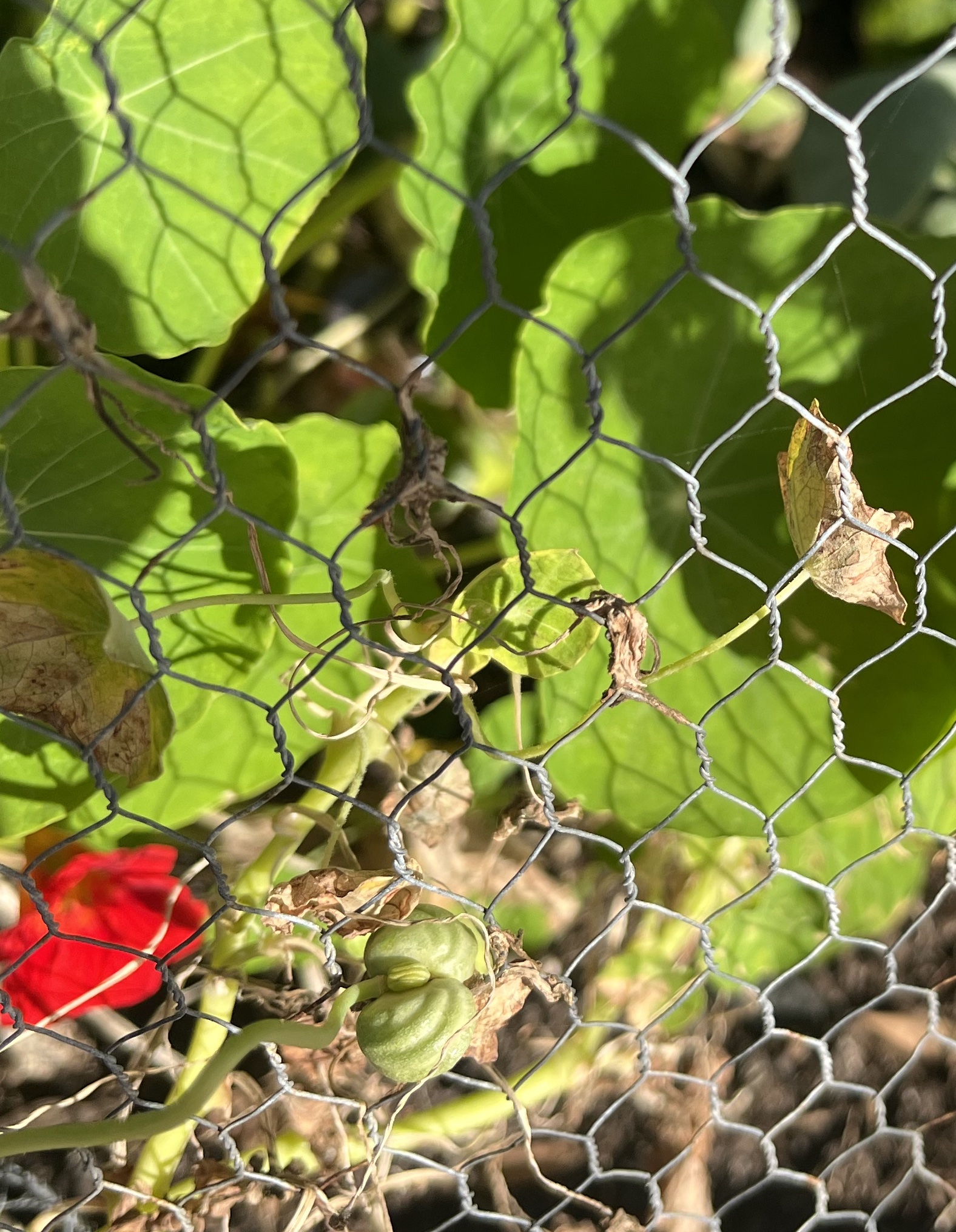
“When you’re working in a strict form, sometimes a certain magic takes place. You realize that the content is finding itself in the form. The form gives you your poem” (Late in the day, 2015, p. 80).
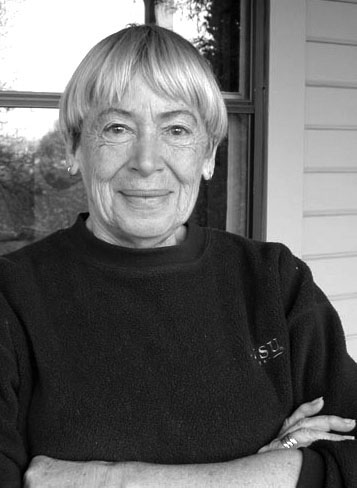
Ursula K. Le Guin
Feminist, science fiction and fantasy writer, poet and non-fiction essayist
In hard times, Le Guin reminds us, we need the voices of writers “who can see alternatives to how we live now, who can see through our fear-stricken society and its obsessive technologies to other ways of being, and even imagine real grounds for hope” (2015, p. 84). Lately, working in the academy feels hard—neo-liberal accountability and performativity measures which insist we need to produce Q1 publications, which insister we need to put together successful grant applications, we must perform exceptional teaching, which insist we need to play the service game, and which insist we need to promote our impact, are relentless. It is hard not to question whose needs are being met by all of this needing to – the origins of the word “need” seem to suggest that we are but dutifully responding to the wants of the institution. And yet, in the hard and needful times we find ourselves in, I insist-er that we need to add our researchers voice to Le Guin’s poetic-political imagining from within to stand against the powerful pressures that need us to conform—we are, you might say, in need of a “resku”.
Rebecca Solnit smiled sardonically some time ago and said, “It turns out that we’re actually capable of something other than neoliberalism and actually we’re really capable of enjoying ourselves more than we do under neoliberalism”. The word “resku” is a portmanteau I created on a whim which blends the two words “research” and “haiku” together in an attempt to save me—and others, perhaps including you—from the dangers of neo-liberalism and reclaim the presence of joy in our research and writing world. Resku draws inspiration from haiku—a form of Japanese poetry which is well known for its 17-syllable brevity and its capacity to capture moments of feeling, intrigue and/or wonder. In bringing resku to life, I was invigorated by the sound and sense-abilities of sciku, another portmanteau word which explicitly refers to the latest scientific and mathematical discoveries as scientific haiku. Founded by zoologist, researcher and writer Andrew Holmes interested in animal behaviour, evolution, welfare, and conservation, “The Sciku Project” aims to rediscover the joys of science and mathematics through haiku. In much the same way, the poetic form of resku seeks to share the research we love, the theories and methodologies we love to work with, and the results of our research that inspire us to work with a poethic that stays true to this love.
A beautiful constraint
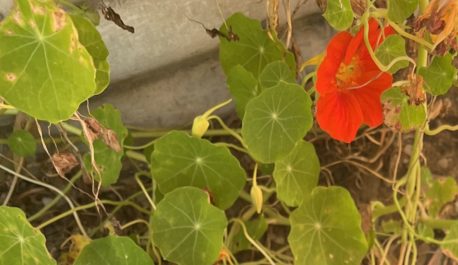
In 2021 I had the pleasure and privilege of joining Dr Christine Watson (VP academic at Red River College and haiku creator by night now famous for her #365daysofhaiku creative project) for a haiku writing workshop where she inspired my colleagues and me to think about the strict 5 + 7 + 5 syllabic three-line structure as a “beautiful constraint”.
“Don’t try to be perfect because it’s the love of the doing rather than the seeking of perfection that makes it beautiful…Some of mine are really, really lame but I do it every day because it brings me joy”.

Dr Christine Watson
VP academic at Red River College by day, haiku poet by night
In the mid 1990s, Chris and I shared a second floor apartment on Douglas Street in St. Lucia while she was a PhD student in English literature at The University of Queensland and not long after I had begun my work there as academic. She spoke often about her love of Japan, having gone there on student exchange, and gifted me the most exquisite set of hand-painted hashi (chopsticks) one year for my birthday. It did not surprise me that she would choose haiku as her creative project and neither did the way in which she wove each and every 17 syllable poem together with Japanesque simplicity, realism and season-sense-ability. It was a joy each morning to wake to a new #365daysofhaiku post from her; eah set of three sentences bringing her warm, wise, witty, and wond spirit so close. Day 268 (#friendship#thanksforthemammories) is a personal favourite, but I was curious to know which haiku she had written Chris herself loved the most. She chose the following three:
Day 248
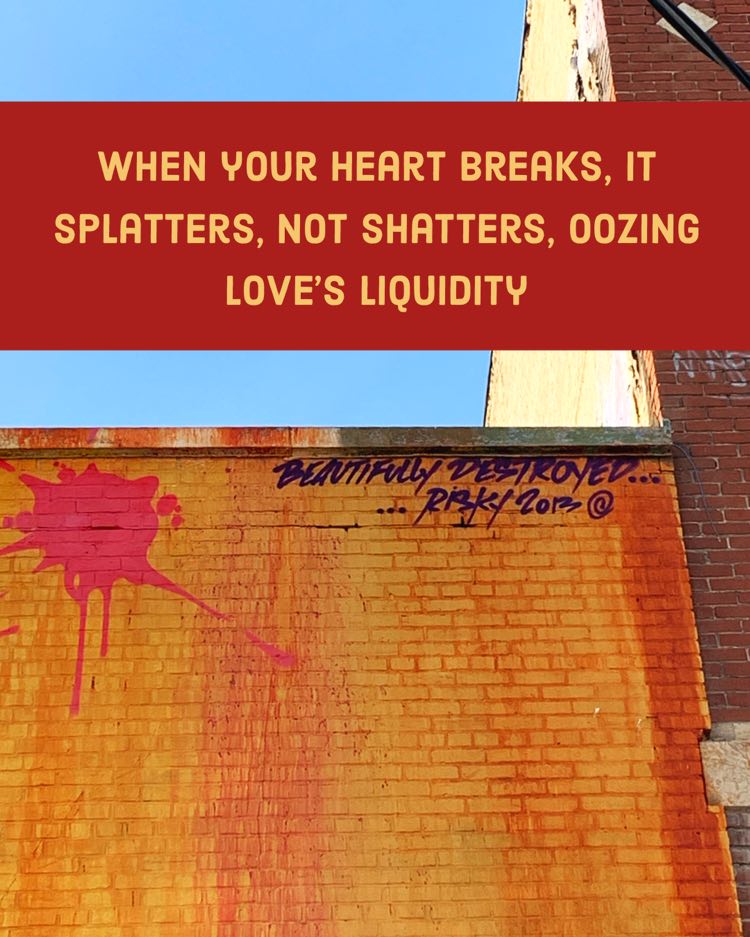
“This is one of my favourites”, she said.
Day 277
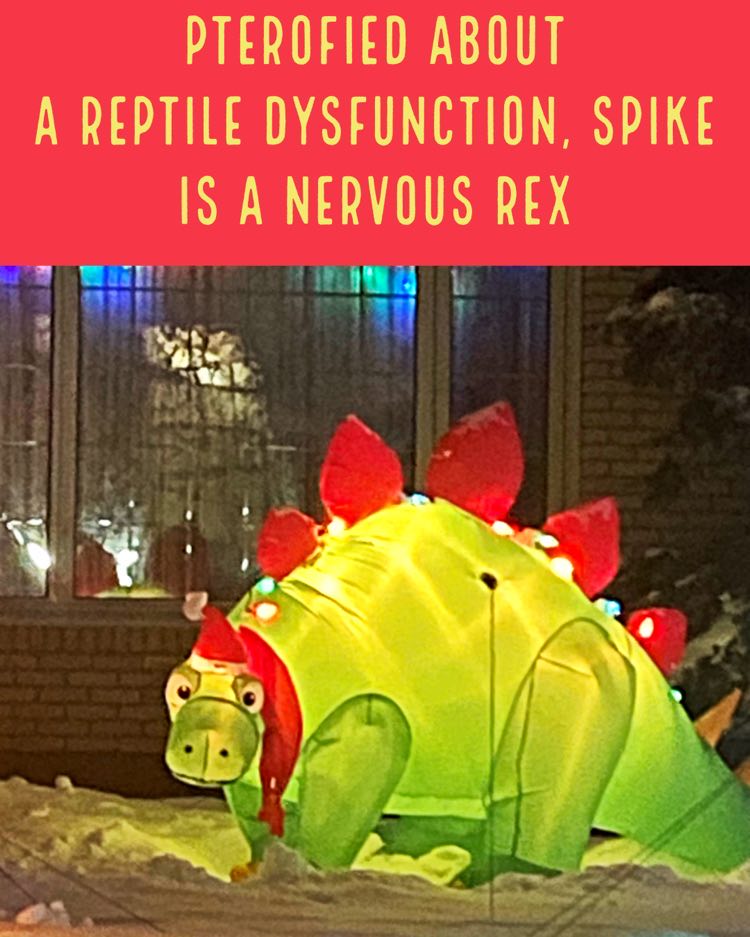
“And this one always makes me laugh!”, she said.
Day 303
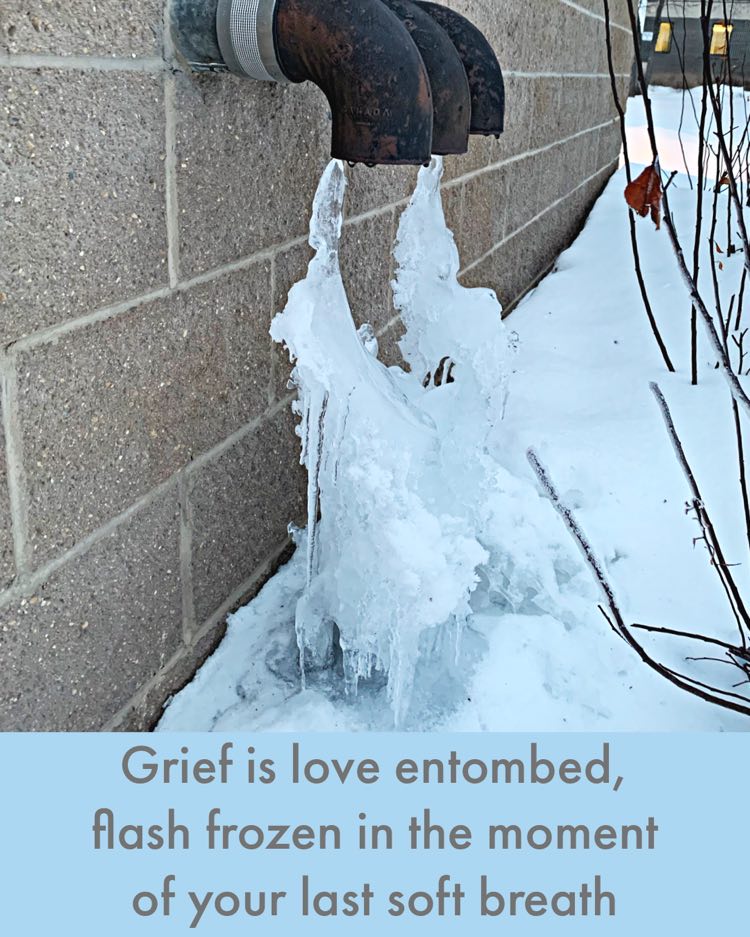
“This one always makes me pause”, she said.
A hush descended upon the room when Chris has finished sharing her suite of haikus, each of us wondering how on earth we were to create something so beautiful with such constraint. Chris simply smiled. “Try not to think too much about counting the syllables”, she explained. “Try to think of haiku as a short moment to present simple imagery that speaks to the senses. Try to think about ways you might juxtapose two opposing images to capture a space where the mundane and the extraordinary collide. Try to think about including a cutting word which enables a pivot between them. Try to remember the ways in which haiku traditionally references nature and the seasons by including a word or two that does the same. The best way to try to do all of this is to take a walk outside. Try to think about your research as you experience the world shimmering around you—what is it that catches your attention and how does it relate to you and your research?”
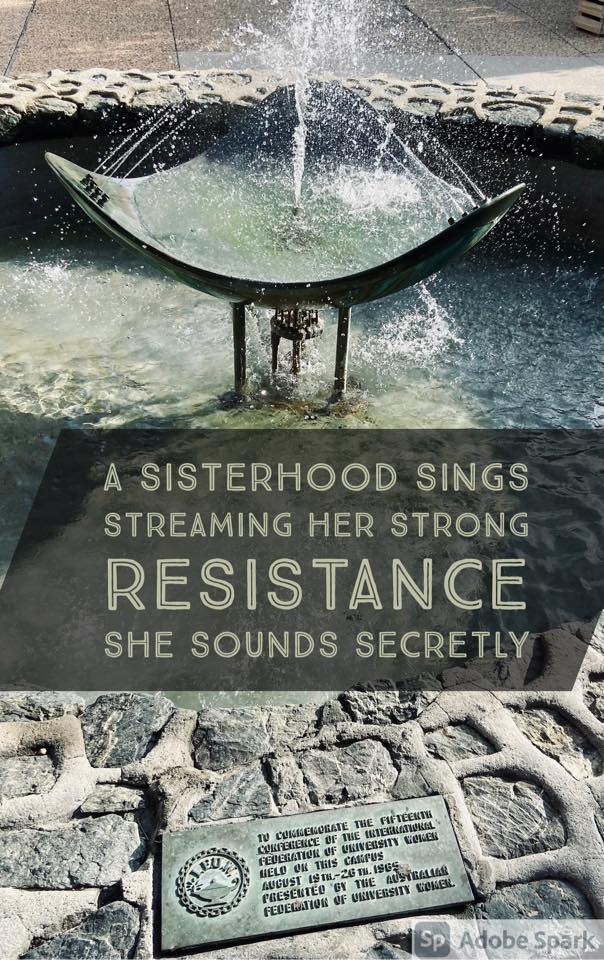
The resku I created from my nature walk drew inspiration from the Weis or Women’s fountain which sits just on the outskirts of the Great Court at The University of Queensland. I had walked past this fountain so many times I had lost count without paying it any mind, but on this day the water sparkled and shone playfully in a willful dance that was difficult to resist. I sat on the edge, relishing the splashes of water planting kisses on my hands and arms, and it was then—and only then—I noticed the plaque which read: “TO COMMEMORATE THE FIFTEENTH CONFERENCE OF THE INTERNATIONAL FEDERATION OF UNIVERSITY WOMEN HELD ON THIS CAMPUS AUGUST 19TH TO 26TH 1965. PRESENTED BY THE AUSTRALIAN FEDERATION OF UNIVERSITY WOMEN”. I whispered a silent thank you to them for it was an Australian Federation of University Women scholarship I received from the South Australian branch in 1992 as an Honours student that most definitely lit the lamp in my spine for feminist academic work. The resku that formed and found me is in homage to those women in the academy who have come before, with and after me.
Nevertheless, she persisted ..and so must we all
Last week while on a planning retreat with colleagues from the Sustainability, Environmental and Arts Education (SEAE) research cluster at Southern Cross University, we were invited to engage in a similar poethical activity—to reimagine our current research through haiku as resku. The challenge criteria were to take a walk outside and let the world soak in, take a moment to reflect on the research you feel drawn to do in this one wild and precious life, take a photo of some thing that shimmers in response, and take these connections into three resku. I wasn’t thinking of any particular research as I stepped outside into the sun and snapped images of this and that; and then, as Le Guin suggests, the poem found me as I encountered the student community garden boxes. I was immediately drawn to the juxtapositions of bright blood red petals and fruit flesh against tropical lime green leaves, nasturtiums and tomatoes moving towards becoming even while bound, and streams of sunlight interrupting the shadows of the woven wirework. Standing still, I heard the shifting sounds of eleven words reverberate five years forward, “She was warned. She was given an explanation. Nevertheless, she persisted”. They were directed towards American Democrat senator Elizabeth Warren by Republican senator Mitch McConnell. McConnell had attempted to silence Warren as she began to read a letter from Martin Luther King Jr.’s late widow, Coretta Scott King on the Senate floor to support her appeals against the appointment of a federal judge well known for his racist record in relation to African Americans and voting rights. Mitchell’s objection was upheld, and an outraged Warren took the letter to Facebook where it was viewed more than 8 million times in 24 hours. Former Democrat Hilary Clinton read the post, cited the eleven words, and tweeted in reply, “So we must we all”.
A new feminist rallying cry was added to our weaponry of words and the following three reskus came to life. They voice my dreams, my daring, and my desires over the past 25 years to sling my carrier bag of stolen tools over my shoulder and do whatever I can, whatever it takes, to speak the words that I do not yet have, to cultivate a world which is free from violence against women. I am speaking these reskus as a woman who has seen, heard, and felt it. Perhaps like Australia’s first female and former Prime Minister Julia Gillard mused as she reflected on her powerful 2012 misogyny speech, this trilogy of 51 syllables represents me simply trying to “find my footing in a pounding sea of sexism, misogyny and hypocrisy” (2022, p. 11). The speaking, as Audre Lorde reminds us, will get easier and it will—indeed, it must—because “where [there are] words of women are crying to be heard, we must each of us recognize our responsibility to seek those words out, to read them and share them and examine them in their pertinence to our lives” (1984, p. 43). I will keep speaking, with as much sweet as salt, even when those around me are too afraid or too angry to listen to what a woman is saying. I hope these reskus erupt quietly on your ears with grace, beauty and energy, much like a Le Guinian volcano, telling truths that change maps, move mountains, and perhaps even make them too.

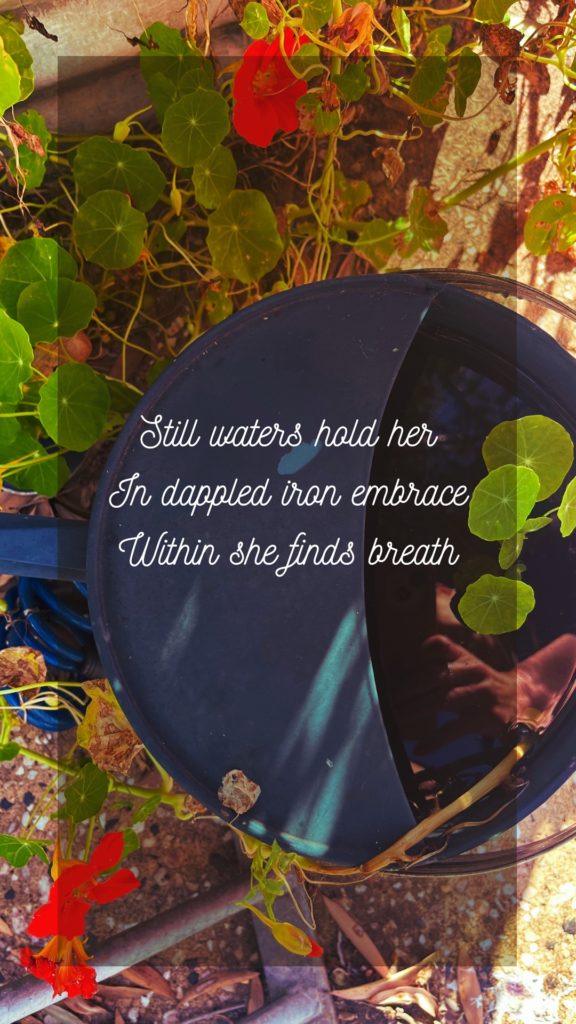
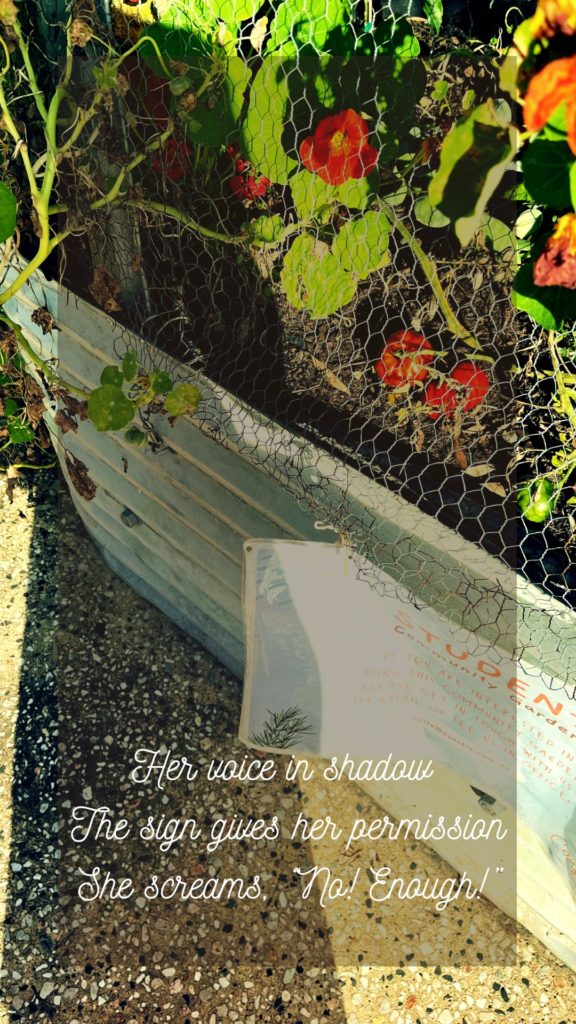
References
Audre Lorde. (1984). Sister outsider: Essays and speeches. Crosssing Press.
Christine Watson. (2021). “Day 248, Day 277, Day 303”. #365daysofhaiku – reposted here with her permission.
Julia Gillard (Ed.). (2022). Now now, not ever: Ten years on from the misogyny speech. Vintage.
Ursula K. Le Guin. (2015). Late in the day: Poems 2010-2014. PM Press.
She’s done it again.
Moved my heart to sing and scream,
Justice WILL prevail!
Thankyou Liz xxx